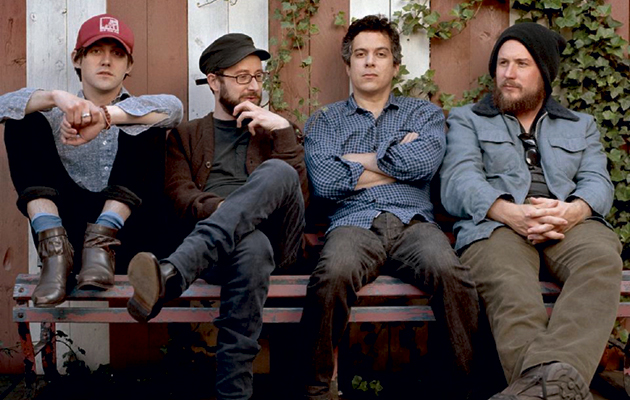There was talk of Hawaii, but they decided on Malibu, California. But Studio Two, Shangri La, a ranch house in the hills of Zuma Beach, brought its own challenges. It’s lousy with the ghosts of big rock geniuses. Dylan slept in a tent in the rose garden in the early ’70s. The Band, Neil Young, Johnny Cash, Clapton, Cocker and Morrison all recorded there.
“At Shangri La by the door in the concrete it says The Band,” James says. “They did a lot of their stuff there. If you’ve seen The Last Waltz, it’s the studio where they rehearsed. You feel those spirits and that presence, but you can’t think about it too much.”
“Thinking about that kind legacy is just really, really difficult,” admits Ward. But, with their amazing harmonies, Monsters Of Folk can’t help but conjure up the legacy of yet another West Coast touchstone.
So, Uncut asks, which one of you is Crosby, which one is Stills and who is Nash?
“Let’s not do that,” James says good-naturedly. “I think we all really dig how different we are. We’re not really like CSN. Our harmonies are a little better.”
James looks over at Oberst for joke approval. It’s a good one. True, CSN’s voices are so intrinsically linked in the public consciousness it’s difficult for each member to step away successfully from the group for too long. The Monsters’ harmonies, on the other hand, seems to be both a product of sheer tenacity and a way to keep the career trajectory compellingly bumpy. For Oberst, it’s all seemed pretty speedy. “I’m not even a good harmony singer,” he says. “It was a new thing for me.”
The initial plan for all three to sing live into one mic, old country style, was soon scrapped.
“These three voices are so fucking different, recording them presented a real challenge,” Mogis says. Once the producer finally devised a way to best capture each distinct vocal with carefully placed mics, something strange happened. Oberst started singing like Ward, whose tone is softer and more romantic. James’ voice, meanwhile, began to take on an Oberst-like sting. “I couldn’t tell whether it was Matt or Conor sometimes. It was fucked up,” Mogis says.
Call it the perils of mutual admiration, but for all the breathless anticipation of those involved, there appears to be very little strategy behind finally sharing these songs with each other and their fans. There’s certainly no acknowledgment of commercially minded synergy beyond their ironic moniker.
“We plan on this being the biggest record anybody’s been involved with ever,” Oberst drawls. “Yeah. It’s our big break,” James laughs. “The retirement plan.”


